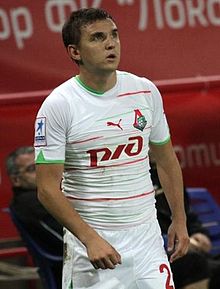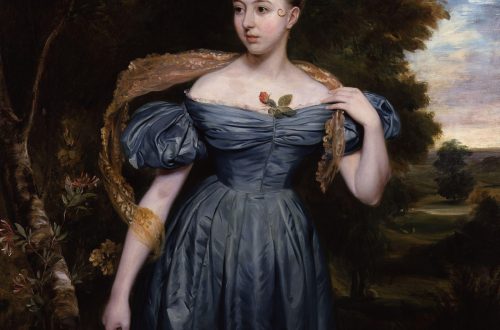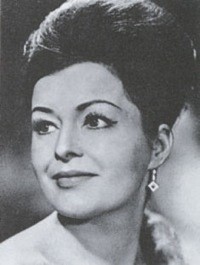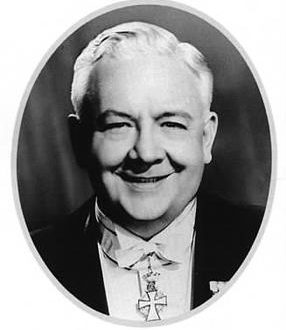
Andrey Alekseevich Ivanov |
Andrey Ivanov
The quiet little town of Zamostye, one of the western outskirts of pre-revolutionary tsarist Russia, was not very rich in events in the field of cultural life. Therefore, it is natural that the amateur children’s choir, organized by the teacher of the local gymnasium Alexei Afanasyevich Ivanov, soon gained wide popularity in the city. Among the little singers were both sons of Alexei Afanasyevich – Sergei and Andrei, ardent enthusiasts of their father’s undertaking. The brothers even organized an orchestra of folk instruments at the choir. The youngest, Andrei, showed a particularly great attraction to art, from early childhood he loved to listen to music, easily capturing its rhythm and character.
At the beginning of the First World War, in 1914, the Ivanov family moved to Kyiv. The atmosphere of wartime was not conducive to musical studies, former hobbies were forgotten. Young Andrei Ivanov returned to art after the October Revolution, but he did not immediately become a professional. After graduating from high school, he first enters the Kyiv Cooperative Institute. Passionately loving music, the young man often visits the opera house, and sometimes sings his favorite tunes at home. The Ivanovs’ neighbor in the apartment, M. Chikirskaya, a former singer, seeing Andrei’s undoubted abilities, persuaded him to learn to sing. The young man takes private lessons from the teacher N. Lund, who fell in love with his gifted student and studied with him for free for three years, since the Ivanov family at that time had very modest means. The death of a teacher interrupted these classes.
Continuing his studies at the Cooperative Institute, Andrey Ivanov simultaneously entered the Kyiv Opera Theater as an extra in order to be able to constantly listen to operas and take at least a modest participation in their productions. He especially liked the singing of the baritone N. Zubarev, and, listening attentively, he involuntarily perceived and assimilated the principles of voice production, the singing manner of a talented artist, which was similar to the method taught by the late Lund.
Rumors about a handsome lyrical-dramatic baritone and the great abilities of a young extra were spreading in musical and theatrical circles, they also reached the opera studio at the Kyiv Conservatory. In September 1925, Andrei Alekseevich was invited to the studio to prepare and perform the part of Onegin in the graduation performance of Eugene Onegin. A successful performance in this performance, credited as a conservatory thesis, decided the future fate of the young singer, widely opening his way to the opera stage.
At that time, along with stationary opera houses, there were mobile opera troupes that traveled to different cities. Such troupes were made up mainly of artistic youth, and quite often quite large, experienced singers also performed as guest performers in them. The organizer of one of these groups invited Ivanov, who soon took a leading position in the troupe. It may seem simply incredible that, having come to the team with the only part of Onegin, Andrei Alekseevich prepared and sang 22 parts during the year of work. Including such as Prince Igor, Demon, Amonasro, Rigoletto, Germont, Valentin, Escamillo, Marcel, Yeletsky and Tomsky, Tonio and Silvio. The specifics of the work of the traveling group – a large number of performances, frequent moves from city to city – did not leave much time for in-depth rehearsal work and systematic studies with the accompanist. The artist was required not only high creative tension, but also the ability to work independently, to freely navigate the clavier. And if a novice singer under these conditions managed to accumulate such an extensive repertoire in the shortest possible time, then he owes this mainly to himself, his great, real talent, his perseverance and love for art. With a traveling team, Ivanov traveled all over the Volga region, the North Caucasus and many other places, captivating listeners everywhere with his expressive singing, the beauty and flexibility of a young, strong, sonorous voice.
In 1926, two opera houses – Tbilisi and Baku – simultaneously invited a young artist. He chose Baku, where he worked for two seasons, performing responsible baritone parts in all theater performances. New parts are added to the previously established repertoire: the Vedenets guest (“Sadko”), Frederik (“Lakme”). While working in Baku, Andrei Alekseevich had a chance to tour in Astrakhan. This was in 1927.
In subsequent years, working in the Odessa (1928-1931), then in the Sverdlovsk (1931-1934) theaters, Andrei Alekseevich, in addition to participating in the main classical repertoire, got acquainted with some rarely performed Western works – Turandot by Puccini, Johnny plays Kshenek and others. Since 1934 Andrey Ivanov is back in Kyiv. Having once left the Kyiv Opera House as an extra in love with music, he returns to its stage as a fairly experienced singer with a wide and versatile repertoire, with great experience and rightfully takes one of the leading places among Ukrainian opera singers. As a result of steady creative growth and fruitful work, in 1944 he was awarded the title of People’s Artist of the USSR. Andrey Alekseevich worked at the Kiev Opera House until 1950. Here, his skills are finally polished, his skills are honed, the vocal and stage images he creates are most fully and deeply revealed, testifying to the extraordinary gift of reincarnation.
The power-hungry and treacherous hetman Mazepa in P. I. Tchaikovsky’s opera and the pure-hearted, selflessly brave young man Ostap (“Taras Bulba” by Lysenko), obsessed with indomitable passion Dirty and full of majestic nobility Prince Igor, the seductive handsome Mizgir and sinister, but pitiful in his ugliness Rigoletto, overcome with despair, the restless Demon and the mischievous love of life, clever Figaro. For each of his heroes, Ivanov found an unusually accurate, thoughtful drawing of the role to the smallest strokes, achieving great truthfulness in revealing the various facets of the human soul. But, paying tribute to the artist’s stage skills, the main reason for his success should be sought in expressive singing, in the richness of intonations, timbre and dynamic shades, in the plasticity and completeness of phrasing, in magnificent diction. This skill helped Andrey Ivanov to become an outstanding chamber singer.
Until 1941, he did not engage in concert activities, as he was very busy working in the theater in the main repertoire. New creative tasks faced the singer at the beginning of the Great Patriotic War. Evacuated with the Kyiv Opera House to Ufa, and then to Irkutsk, Andrey Alekseevich takes an active part in the artistic maintenance of hospitals and military units. Together with his stage comrades M. Litvinenko-Wolgemut and I. Patorzhinskaya, he goes to the front, then performs in concerts in Moscow and other cities. Returning to liberated Kyiv in 1944, Ivanov soon went from there with concerts to Germany, following the advancing units of the Soviet Army.
The creative path of Andrei Ivanov is the path of an original, brightly gifted artist, for whom the theater was at the same time a school. If at first he accumulated a repertoire by his own work, then later he worked with many major figures in the musical theater, such as director V. Lossky (Sverdlovsk), conductors A. Pazovsky (Sverdlovsk and Kyiv) and especially V. Dranishnikov (Kyiv) , played a significant role in the development of his vocal and stage skills.
This path naturally led Andrei Alekseevich to the capital’s stage. He joined the Bolshoi Theater in 1950 as a mature master, in the prime of his creative powers. His operatic repertoire, including radio recordings, consisted of up to eighty parts. And yet the singer did not stop in his creative quest. Performing in such familiar parts as Igor, Demon, Valentin, Germont, he found new colors in each of them, improved their vocal and acting performance. The scale of the Bolshoi stage, the sound of its opera orchestra, creative collaboration with excellent singers, work in the theater and on the radio under the direction of conductors N. Golovanov, B. Khaikin, S. Samosud, M. Zhukov – all this was an incentive for the further growth of the artist, to deepen the created images. So, the image of Prince Igor becomes even more significant, even larger, enriched in the production of the Bolshoi Theater with an escape scene, which Andrei Alekseevich had not had to deal with before.
The singer’s concert activities also expanded. In addition to numerous trips around the Soviet Union, Andrei Ivanov repeatedly visited abroad – in Austria, Hungary, Czechoslovakia, Germany, England, where he performed not only in large cities, but also in small towns.
The main discography of A. A. Ivanov:
- A scene from the opera “Tsarskaya nevesta”, the part of Gryaznogo, recorded in 1946, choir and orchestra of GABTA p/u K. Kondrashina, partner — N. Obukhova and V. Shevtsov. (Currently, the CD has been released abroad in the series “Outstanding Russian Singers” about the art of N. A. Obukhova)
- Opera “Rigoletto” J. Verdi, part Rigoletto, recording 1947, choir GABT, orchestra VR p/u S. A. In Samosuda, his partner is I. Kozlovsky, I. Maslennikova, V. Borysenko, V. Gavryushov and others. (Currently, a CD with the recording of the opera has been released abroad)
- Opera “Cherevichki” by P.I. Ivanov, M. Mikhailov, E. Antonova and others. (Currently, a CD with the recording of the opera has been released abroad)
- Opera “Eugene Onegin” by P. I. Tchaikovsky, part of Onegin, recorded in 1948, choir and orchestra of the Bolshoi Theater conducted by A. Orlov, partners – E. Kruglikova, M. Maksakova, I. Kozlovsky, M. Reizen. (Currently, a CD with the recording of the opera has been released abroad)
- Opera “Prince Igor” by A. P. Borodin, part of Prince Igor, recorded in 1949, choir and orchestra of the Bolshoi Theater Theater, conducted by A. Sh. Melik-Pashaev, partners – E. Smolenskaya, V. Borisenko, A. Pirogov, S. Lemeshev, M. Reizen and others. (Currently CD released overseas)
- Solo disc of the singer with recording of arias from operas in the series “Lebendige Vergangenheit – Andrej Ivanov”. (Released in Germany on CD)





